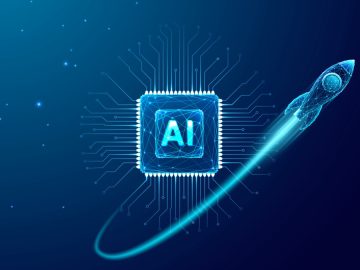While the flexibility of remote work and study remains appealing as ever, some in-person experiences just can’t be beat.
This fall, Penn State’s Master of Artificial Intelligence program is going hybrid. Previously online-only, the degree is now offering in-person courses. The Great Valley campus in Malvern, PA, has state-of-the-art facilities, like an engineering lab, insights lab and access to supercomputing services.
“When students are working on compute-intensive AI projects trained on large data models, it can take a lot of time to go through the data, recognize patterns and then know what to do with those patterns,” said Raghu S. Sangwan, associate chief academic officer and director of engineering programs. “They need the power of the kinds of machines our facilities provide to do complicated work in a time efficient manner.”
The brick-and-mortar lab spaces enable students to not only conceptualize AI-driven ideas, but physically build and test prototypes in house.
One team of students used the engineering lab to build components that could increase the resolution of a smartphone’s camera and created an AI system capable of diagnosing diseases of the eye. The application can be used by a mobile healthcare team in rural areas where access to eye care specialists, and healthcare in general, is limited.
“It’s never a dull moment on campus,” Sangwan said. “Our program is dynamic, agile and innovative.”
One of the nation’s best for engineering
Penn State’s engineering programs are ranked among the top three in the nation, with its information technology and computer science programs in the top seven. The highly-regarded university is formally based in State College, PA. The Penn State Great Valley School of Graduate Professional Studies, located just outside of Philly in Malvern, PA, is one of the university’s 25 smaller campuses across the state.
In his 20th year as an academic leader at Penn State Great Valley, Sangwan understands why the campus is referred to as the “jewel in Penn State’s crown.”
“We embrace the evolution of technology,” he said, detailing how flexible the curriculum has been in keeping up with developing frontiers.
“Twenty years ago,” Sangwan said, “we were largely teaching traditional engineering disciplines. Then people began designing and integrating off-the-shelf components to build large complex systems, so we added a program in systems engineering. Many of these systems were software-intensive, so we added software engineering and information sciences. Then the world became data-driven, so we launched our data analytics program.”
And the latest evolution? “Now it’s AI,” Sangwan said. “We are always exploring the horizon, learning and launching new programs.”
Learn more about Penn State Great Valley’s Master of AI program
Upskilling powered by flexibility and innovation
The Master of AI program can be taken full- or part-time, online or hybrid with on-campus courses. Full-time, the 30-credit program runs for three semesters over the course of 18 months.
The program is innovative for a handful of reasons, said Sangwan. For professionals seeking work/life balance, the course load can be split into what they call stackable certificates. The certificates — typically three to four courses each — build to a full master’s degree, the content sliced into meaningful segments.
“Each certificate enables you to upskill yourself, so you become more marketable before you’ve even finished the entire program,” Sangwan said. “By the time you’ve earned two certificates, you’re only one away from your master’s degree and it feels less daunting.”
I didn’t know where I’d fit this in, but the instructors answered all my questions.Savitha Kolar Penn State Master of AI alum
There’s also an innovative focus on experiential learning. All of the courses blend theoretical foundations with practical applications, enabling students to engage with local industry leaders and tackle real world problems for more immersive learning.
Lastly, the academic leadership team conducts extensive surveys of the industry to compile and maintain a current list of employers’ most desired AI skills, said Youakim Badr, the professor of data analytics and AI who oversees the Master of AI program. Leaders then design the curriculum and certificates around those skills to make sure graduates are real-world ready immediately upon completion of the program.
A wealth of AI roles to explore
“There are so many options for careers in AI,” Badr said. “You can solve problems in cyber security, like building AI tools for intrusion detection and detecting abnormal behavior. You can be an artificial intelligence specialist, robotics engineer or an AI ethics specialist.”
There are even applications you might not yet know exist, like Savitha Kolar’s role helping universities adapt to and apply AI technologies to the academic space.
Kolar, a data science specialist and former Penn State University employee, was working toward her graduate certificate in applied statistics through Penn State World Campus — Penn’s online degree program — when she saw an ad for the Master of AI degree.
“I thought, ‘I need to pursue this,’” Kolar said. “AI isn’t going away. You adapt or you become irrelevant.”
The benefits of hybrid learning
The flexibility of online coursework was crucial for Kolar, who had a full-time job and young children at home. She credits an engaged faculty with helping her understand her course options and necessary pre-reqs in order to plan a schedule that worked for her lifestyle.
“I can’t say enough good things about the program,” Kolar said. “I was nervous going into this because my life was already very full. I didn’t know where I’d fit this in, but the instructors answered all my questions.”
For Kolar, the program was valuable not just for its course work, but the extracurricular opportunities to participate in AI meetups and national competitions where they presented proposals and minimum viable products.
“This [program] is a great way to upskill yourself or get into the industry,” she said. “If you have a curious mindset and are analytical, you should definitely do it.”
For graduate students looking to engage in person, the Great Valley campus is fertile ground for meeting and building relationships with local companies in the industry, applying what they learn by collaborating on real-life projects or winning grant sponsorship funding for their research.
“We have such a close relationship with students and professionals from all facets of the industry,” Sangwan said. “We’re always keeping ourselves abreast of what’s going on and what the industry needs next. It’s exciting.”
“We have many ideas to expand the program,” Badr added. “And a lot of resources to continue building something outstanding.”
Learn more about Penn State Great Valley’s Master of AI program





